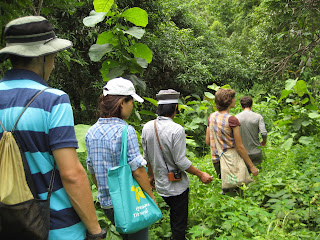In the interest of continued development and improving our
service to our network partners, the staff, volunteers, and interns of ECHO
Asia’s Seed Bank recently took a field trip to visit the organic farming
community in Mae Tha, Thailand, about 5 hours south of our Seed Bank facility
in Fang, and about an hour southwest of ECHO Asia’s Office in Chiang Mai. Thirty years ago, under the leadership of
Khun Por Phat, this community began questioning the sweeping trends of large-scale,
chemical vegetable production and, forming a cooperative, started concentrating
its efforts on growing food in ways that it felt would best nourish its people,
preserve the environment, and leave a heritage for its future generations.
The lush green and the lightness of the air were the first
impressions to greet our travel-weary group upon arrival. Thereafter, it seemed that each member found
something fascinating and relevant to his or her own focus transplanted from
our daily jobs to this determinedly chemical-free community.
“The companion
planting!” exclaimed our Production Manager, Leu, eagerly. (He and another ECHO Asia intern, Jen, have been working
closely on the issue of pest management in our own seed production plots.) “Pumpkins, chilies, bottle gourd and beans
being grown and trellised together! “Oh
and see the basil with the eggplant!” “And
the flowers! Kimberly, did you see the
flowers they were growing around the plots to attract beneficial insects?”
“Yes! Biodiversity seemed key,” agreed Jen, after the visit “Their emphasis on indigenous vegetable
varieties and their care of the soil appeared absolutely critical to their
ability to produce healthy plants and ones that will withstand the current
changes in climate and environment.”
The raised, net-covered seedling nursery and seed-drying
racks struck our technician, Asang.
Ongoing run-ins with pests of every kind in our nursery, not to mention
fungus, have given him a run for his money.
“Don’t forget Khun Por Phat’s charisma, though,” chimed in
James (another intern). “He’s the one
that took the time to observe the growing patterns inherent in the natural
world, think through the long-term effects of chemical inputs, and ultimately
convince his neighbors and friends that organic farming practices and local
plants were to be preferred to hybrids and heavy pesticides. And remember the farmers who shared with us
on our visits to their farms?! What
about that lady who has only been practicing organic farming for 3 years? She understands what she is doing and why it
works. She didn’t just spout some
‘chemical free’ mantra, but was able to explain the differences she has seen in
her farm, her vegetables, and her family’s health since she began.
All of our local staff was impressed with the long-rang
planning of one farmer for his family.
Being the father of a single daughter, he has anticipated her and her
mother’s needs down the road when he might not be around to support them any more
by planting teak trees. "In 20 years they’ll
be large and valuable enough to sell for whatever they may need," he informed
us.
Our big-picture lady, Ruth summarized our two days of visits
and farmer interviews: “It’s what we’re doing. ECHO Asia’s approach is one of service to our
network. Mae Tha’s is doing ‘community
development’ from within.
While we focused on the particulars most relevant to our
individual work and family challenges at present, Khun Po Phat, in a sala over
looking the agroforest he’s been nurturing for 25 years from the soil of a once
barren hill, reflected on the sum total of what clean air, healthy soil, and strong
plants actually add up to. “Feel that
breeze. Isn’t it delicious?” he inquired
stretching into it. “We’re free, we have everything we need, and we’re happy!”










No comments:
Post a Comment